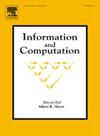State complexity bounds for projection, shuffle, up- and downward closure and interior on commutative regular languages
IF 1
4区 计算机科学
Q3 COMPUTER SCIENCE, THEORY & METHODS
引用次数: 0
Abstract
We consider the state complexity of projection, shuffle, up- and downward closure and interior on commutative regular languages. We deduce the state complexity bound for upward closure and downward interior, and , , and for the shuffle on commutative regular, group, aperiodic and finite languages, respectively, with state complexities n and m over the alphabet Σ. We do not know whether these bounds are sharp. For projection, downward closure and upward interior, we give the sharp bound n. Our results are obtained by using the index and period vectors of a regular language, which we introduce in the present work and investigate w.r.t. the above operations and also union and intersection. Furthermore, we characterize the commutative aperiodic and commutative group languages in terms of these parameters and prove that a commutative regular language equals a finite union of shuffle products of commutative finite and commutative group languages.
交换正则表达式语言上的投影、洗牌、上下闭合和内部的状态复杂性边界
我们考虑了交换正则表达式上的投影、洗牌、上闭合、下闭合和内部的状态复杂度。我们分别推导出了上封和下内的状态复杂度边界 n|Σ|,以及换元正则语言、群语言、非周期性语言和有限语言上的洗牌的状态复杂度边界 (2nm)|Σ|、(nm)|Σ|、(n+m-1)|Σ| 和 (n+m-2)|Σ|,其状态复杂度分别为字母表 Σ 上的 n 和 m。我们不知道这些界限是否尖锐。我们的结果是通过使用正则表达式的索引和周期向量得到的,我们在本研究中引入了索引和周期向量,并对上述操作以及联合和相交进行了研究。此外,我们还根据这些参数描述了交换非周期性语言和交换群语言的特征,并证明交换正则表达式等于交换有限语言和交换群语言的洗牌积的有限联合。
本文章由计算机程序翻译,如有差异,请以英文原文为准。
求助全文
约1分钟内获得全文
求助全文
来源期刊

Information and Computation
工程技术-计算机:理论方法
CiteScore
2.30
自引率
0.00%
发文量
119
审稿时长
140 days
期刊介绍:
Information and Computation welcomes original papers in all areas of theoretical computer science and computational applications of information theory. Survey articles of exceptional quality will also be considered. Particularly welcome are papers contributing new results in active theoretical areas such as
-Biological computation and computational biology-
Computational complexity-
Computer theorem-proving-
Concurrency and distributed process theory-
Cryptographic theory-
Data base theory-
Decision problems in logic-
Design and analysis of algorithms-
Discrete optimization and mathematical programming-
Inductive inference and learning theory-
Logic & constraint programming-
Program verification & model checking-
Probabilistic & Quantum computation-
Semantics of programming languages-
Symbolic computation, lambda calculus, and rewriting systems-
Types and typechecking
 求助内容:
求助内容: 应助结果提醒方式:
应助结果提醒方式:


